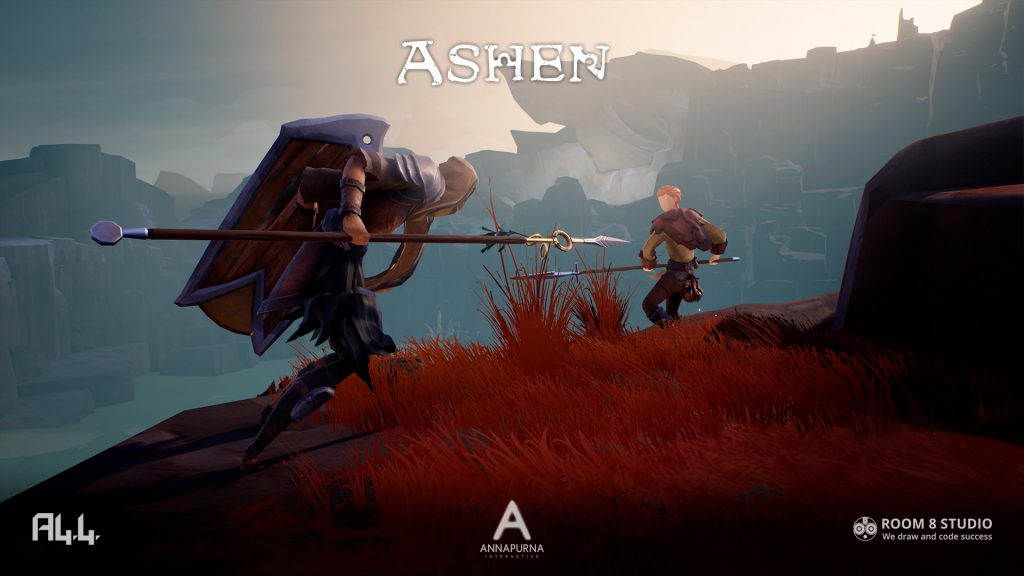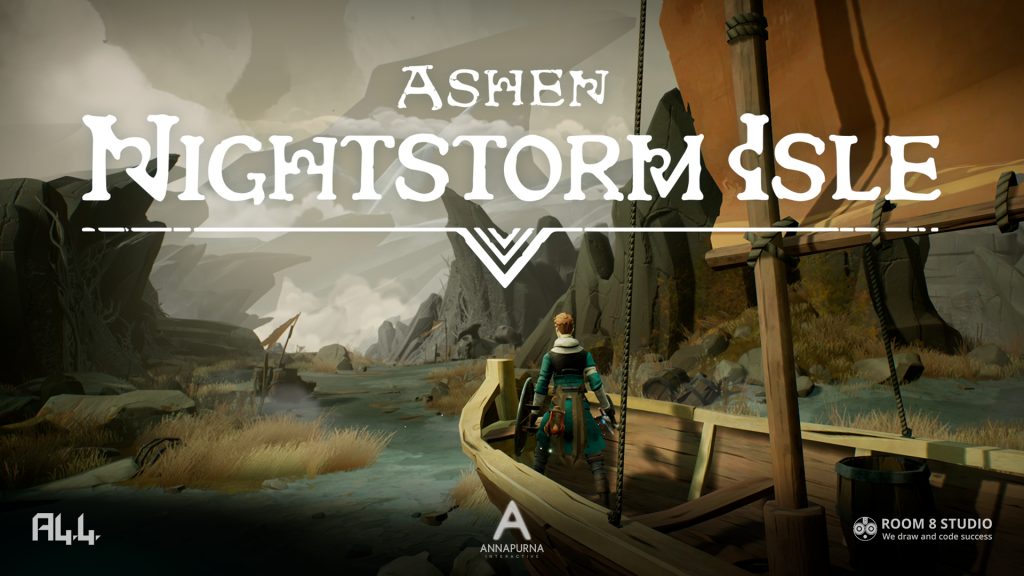Ashen on Switch and PS4: How to Succeed In Serial Porting
It’s been a while since we shared details of our porting projects in the blog. One of the most exciting updates is here: Room 8 Studio ported Ashen to Nintendo Switch and PS4 in collaboration with our partner Annapurna Interactive.
Ashen is a fantastic 3rd person action RPG with a tight and thrilling game design. Developed by New Zealand studio A44 and published by Annapurna Interactive, this game was immediately well-received and loved by the players since its first release in December 2018. Porting this title, originally developed for Xbox One and Windows, to Nintendo Switch and PlayStation 4 was an entirely consistent and reasonable step.
We listened to our passionate community, and are so very excited that more players than ever before will be able to delve deep into the world of Ashen, either on your own or with a friend.
Lorien, Community Manager
A44 Games
After making this decision, it only remained to make the porting of maximum quality while transferring into the new platforms all the values that caught the players’ interest in the original version.
This article takes a look at the most exciting details of how Room 8 Studio ported Ashen into these two highly popular consoles. We’ll also reveal why strong and meticulously-built partnerships in game development and porting can bridge all gaps to a successful title release. Based on this and other experiences gained in collaboration with one of our long-term partners—Annapurna Interactive.

Long Term Partnership vs One-Time
Room 8 Studio porting team started work on this project in February 2019 and has been working simultaneously on adapting the game to Nintendo Switch and PlayStation 4. The upcoming release on both platforms was appointed in December of the same year. The workflow process established during the previous porting projects with the publisher — Donut County and What Remains of Edith Finch saved both teams’ time and effort on project setup. It allowed us to proceed to execution immediately.
A partner should be kept in the loop with all things, starting from clear and feasible commitments and finishing with as few barriers in the way as possible. This approach creates an atmosphere of trust between an external team and a partner. To not turn the process into a hustle for both sides, it’s common to divide the process into stages, designate milestones and define a delivery process. Adding clear acceptance criteria and milestone deliverable definitions to the agreement is critically important and helps to evaluate whether the external team achieved port development goals accurately.
Project Milestones
Based on Room 8 Studio’s experience in porting titles of various genres, we’d like to share some reference project milestones for porting into Nintendo Switch, PS4, and Xbox One:
Milestone 1. Goal: the game should run but may encounter crashes and significant bugs.
Milestone 2. Goal: it should be possible to play the game until the end and experience the core user story. The build may contain some bugs.
Milestone 3. Goal: the game should be playable and not contain any critical bugs; FPS should be close to 30.
Milestone 4. Goal: final polishing of a game and platform optimization. The game should be bug-free and as ready for release as possible.
Right External Team
To ensure such a level of communication and consistency from one game porting the project to another, it’s vital to gather the right team. We already shared our thoughts on how to choose a porting team for your title and now can add that the right team is a sustainable one with a high level of teamwork. There is a correlation between the level of interaction inside the team, overall team effectiveness, and the ability to adapt to the ever-changing landscape. That is why here at Room 8 Studio, we strive to keep the core porting team constant while preserving scale-up opportunities when needed, especially porting multiple titles for the same partner.
The consistent approach from the partner’s side is also an essential factor. We are grateful to our partner Annapurna Interactive that the stakeholders remain the same from project to project.
Challenges We Faced And Overcame
Being a big and comprehensive game porting project, the porting of Ashen endured some challenging moments. Thanks to the experience we gained in all previous ports, most of the challenges were highly predictable and were fixed before they caused any delay in the process.
Graphics
Naturally, open-world games have huge arrays of graphic information. With the high quality of art and lots of details, these 3D meshes cause a massive CPU and GPU load. So, when porting such titles to smaller screens of consoles, the challenge of preserving highly detailed graphics while maintaining the same performance is always there.
One of the most challenging passes in optimizing graphics for PS4 and Switch was working on the characters’ appearance and clothing. The characters in Ashen have stunning costumes that should look cool not only in a static position but also naturally change conditions during the character’s movement. This required a lot of effort, both by artists and developers, who did most of the optimization work right on the Unreal Engine.
Multiplayer
One of the most challenging areas of work was setting up Multiplayer gameplay. The game’s mechanics involve the presence of an AI buddy to help players during their missions. There also is a possibility to connect two real players instead of using the AI-buddy. It was necessary to make the connection between two players smooth and evident and add a warning each time when a real player replaces artificial intelligence.
In addition, it was necessary to rewrite the logic of such connections in terms of platform and store requirements. In the initial version of the game, two real players were connecting on the native server of the game developer (A44). Therefore, we needed to reroute these processes through the Nintendo and Sony servers.
Project Highlights
DLC
The main highlight of this porting project was the presence of a DLC in the game. Ashen’s ‘Nightstorm Isle’ is an additional journey that gives a player a chance to wander through a new world with a mission full of cryptic promises of rewards to be discovered.
It was the first time when our team worked on porting the DLC. We started in August 2019 and were extremely happy to finish in time to release it together with the main game in December on Switch and PS4.
When working with DLC, you should consider a separate procedure for submission to the store and rather complicated compliance testing on each platform. It is also important to provide simple and clear mechanics of how a player can access DLC while preserving the commercial aim. We made this content easy-downloadable, eliminating the possibility of using it for free and transferring it from one player to another.

Compliance Testing and Store Submission
The team addressed some questions from Nintendo during the process, but the build was accepted and required minor changes after the three weeks of the testing procedure.
As for the submission to the PlayStation Store, the requirements are much more complicated and represent a huge test with around 100 cases to accomplish. We passed it on the second attempt and the most joyous moment was that the preparation for this compliance testing helped our QA team greatly pump skills and gain new professional expertise.
The bottom line
Summing up the implementation of this big project that became our third porting for Annapurna Interactive, we’d like to say that even if success in game development may come overnight, it usually doesn’t happen in isolation—genuine partnerships ignite creation.
A specialized porting team can help game publishers and developers save time and costs, cut the project management overhead, and, most importantly, ensure the game runs natively on the desired platform, whether it’s Switch, PS4, or Xbox. A long-term porting partner can be an extension of your core team that thinks of your titles’ success and keeps consistency through the projects.
Building long-lasting cooperation with one porting partner is beneficial for both sides. A game publisher has their games properly ported into the desired platforms, and for the external team, it’s a constant skill upgrading and new titles in the portfolio. Besides, such cooperation mitigates many risks from both sides, like communication gaps, misalignment, workflow differences, unfulfilled expectations, and many more risks highly probable in a new-made partnership.
Have a project in mind?
Let’s create the game of your dreams together!



